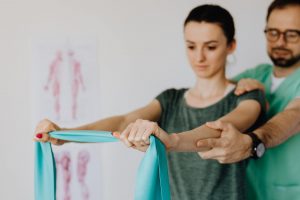Top Covid Recovery Tips
You or a loved one recovering from covid-19……
Want to know what you can do to give yourself the best chance of getting healthy as quick as you can and getting back to the things you love to do?
We get it, it’s been a long couple of years and it would be nice to feel like we are living in the post covid world (utopia).
What we do know is, going too hard too soon when you’re recovering from any illness can slow down your recovery.
Lounging around all day watching netflix and not getting back into a routine is unlikely to be helpful either.
So how do we find the balance and give ourselves the best shot at a better recovery?
We chatted to our Osteopaths about what we know about lingering covid and recovery support.

LONG COVID
It’s currently estimated that 10-30% of people will develop ongoing symptoms, which has been termed “long covid”
There are no internationally agreed upon guidelines in regards to exactly what it is, or how long it lasts, or exactly what to do about it, so we will do our best to inform you as best as we currently can.
Long covid is where you continue to experience symptoms for more than 4+ weeks (30% of people) after infection. Some international medical groups are defining long covid as 12+ weeks (approx 10%). Some people have symptoms for over a year after testing positive, for no other identified reason, other than a recent covid infection.
It doesn’t just affect people who have had a serious case of covid, but can even affect people who initially just had a mild sniffle or cold like symptoms.
More common symptoms of long covid include:
- Extreme or excessive tiredness
- Ongoing shortness of breath
- Chest pain for no other known cause
- Brain fog (memory and concentration issues)
- Body aches and pains
- Loss or changes to taste and smell
Less common symptoms include:
- Insomnia
- Speech or word recall issues
- Changes to hearing or vision
- Hallucinations
- Digestive problems
- Changes to reproductive cycle
- Skin problems
In fact one study trying to understand more about it has identified hundreds of potential symptoms.
WHAT CAUSES LONG COVID OR ONGOING ISSUES?
No one has been able to clearly identify exactly why some people are developing ongoing problems long after the initial infection has passed.
One theory is that the infection stimulates the immune system to go into overdrive and potentially attack your own tissues.
Another possibility is that the infection has caused blood vessel irritation and therefore blood flow issues which could have some lasting impact.
Or the virus could be damaging cells in many organs, leading to the vast array of symptoms.
There is currently no specific test to determine exactly who has it, but rather it is diagnosed by a doctor.
Saying that, researchers are finding trends in some people’s blood tests (such as elevated cytokines – a marker relating to immune function), changes to blood coagulation (thickness / clotting) and even changes to some protein levels (suggesting nerve related issues).
As these are not definitive tests for the condition, it is not appropriate for your doctor to send you for these tests
ARE SOME PEOPLE MORE AT RISK
Overseas reporting has identified different groups as potentially having a higher chance of developing it, including:
- Women
- People aged 35-69
- If you have underlying conditions or other health concerns
- If you work in the health care or social care fields
- People with lower financial capacity
- Some ethnic groups
But there is no agreement and we will likely learn more about it over time.
It’s important to note that long covid symptoms have been identified in some children and if they are experiencing symptoms, it is very important that they are assessed by a health professional.

TREATMENT
At this stage, there is no specific medication for this condition, it is rather about helping people manage symptoms and lifestyle consideration to support people to recover.
TOP TIPS
HOW TO GIVE YOURSELF THE BEST CHANCE OF A BETTER RECOVERY FROM EITHER ACUTE COVID INFECTION OR LONG COVID
1. Firstly let yourself recover.
This may sound obvious, but I don’t know how many times we see people who are sick and the moment they start to feel a little bit better (but not completely) they try to jump back into all regular activities.
In essence, what we are saying is, pace yourself.
This can be trickier than it sounds right now.
You may be looking after children, caring for others who are currently unwell, or your work may be short staffed and may be desperate to have you back on board asap.
Just because you have been isolating for 7 days, doesn’t necessarily mean you should get back to it.
In fact, if you still have cold and flu-like symptoms, such as a runny nose, fever or productive cough, you should still be isolating as you may very well still be infectious.
For most symptomatic people, 10-14 days is more likely to be realistic to be over the initial bout of the infection.
You can test yourself with a home rapid antigen test to test infectivity.
While PCR test and rapid diagnostic tests (clinical / professional rapid antigen tests) are likely to show ongoing positive results for some following infection, a standard home rapid antigen test is much more likely to show a negative result once your are no longer contagious.
2. Get yourself back into a routine (it may not yet be your normal routine)
Set yourself up for success by telling your body clock via your routine and habits what you should be doing when.
Get up at a similar time each day, eat and drink regularly, go to bed on time (or early).

3. Focus on Activities of Daily Living first
You should be able to perform all the essential care needs for yourself such as showering, cleaning, meal preparation before demanding additional work of yourself.
4. Be realistic with your exercise routine
Don’t expect to get straight back into any sport or gym routines as soon as you feel better.
Focus on low impact exercises, such as stretching, yoga or walking and make sure you can maintain a conversation while doing them, before slowly increasing any physical demand.
Start with 10-15 minutes and build your way back up to 30 minutes, according to how well your body feels at the time as well as gauging how well you recover between any exercise sessions.
If your child is returning to school, it may be appropriate to hold back on PE classes / sport for the first couple of weeks, monitoring how your child adjusts back into other regular activities first.
For people who participate in group sporting activities, here is a link to the most current international guidelines from British Medical Journal to outline return to sport following COVID-19 infection click here.

5. Hydrate
Being unwell can dehydrate you, including throwing out your electrolyte balance.
Drink plenty of fluids, it doesn’t all have to be water, but we do recommend lots of it.
The amount of water / fluids people need varies according to many factors, including the environmental temperature, how much you sweat, your physical activity level, medications etc.
Don’t ignore being thirsty and your urine should be a light straw colour.
6. Eat the rainbow
Your appetite or digestive function may be affected, so ensure you are eating small amounts relatively regularly.
Try to eat a variety of nutritious foods, such as fruit, vegetables, protein, wholegrain foods and dairy or dairy substitutes.
7. Omega 3 fatty acids for anosmia (loss of smell)
While not conclusive, according to an expert panel of ear, nose and throat specialists in the United Kingdom, omega 3 fatty acids may assist people experiencing anosmia for two or more weeks, in addition to standard treatment.
While people often take omega 3 supplements, the absorption of most nutrients is better from eating a nutritious diet. Foods containing high amounts include mackerel, salmon, hering, oysters, sardines, anchovies, caviar, flax seeds, chia seeds, walnuts and soybeans.
Smell (olfactory) retraining has been used for anosmia following other viral infections. Some benefit may be obtained by sniffing eucalyptus or clove essential oils or coffee, at the very least, it won’t do you any harm, so definitely worth giving a go.
8. Get your daily dose of sunshine
Increased vitamin D levels have been positively associated with a reduction in covid severity, which you can get freely from exposing your skin to sunshine.
As always, we recommend avoiding getting burnt, so best to get your sunshine before 10am or after 5pm to avoid the high UV levels in the middle of the day.

9. Don’t waste your money on these supplements following COVID-19 infection
Vitamin C, zinc, potassium and selenium supplements only help people who have low levels of these in the blood and have inadequate dietary intake. Eating a wide variety of fruit, meat, veggies and whole grains will get these into you and are more likely to be absorbed and will support your immune function more than having a tablet.
While apple cider vinegar can be great, it won’t help you specifically for COVID recovery. Same goes for colloidal silver, olive leaf extract, miracle mineral solution (MMS) otherwise known as sodium chlorite, oleandrin and ingesting of essential oils.
10. Probiotics may be helpful
While there is no evidence that probiotics prevent COVID or reduce hospitalisation from it, one study showed it may help with viral clearance in people with mild covid symptoms. Speak to your health professional about if this may be relevant for you.
11. Supplements worthy of consideration (this is not a recommendation)
There are some small research trials showing potential positive benefit for the following supplements. Speak to your health professional about if this may beneficial for you.
–L-arginine (an amino acid) helps you produce more nitric oxide, relaxing blood vessels and supports healthy blood flow. One study showed some benefit with severe covid related pneumonia.
– Black (nigella) seed – small studies have shown potential benefit in reducing symptom severity, but is definitely still considered emerging research.
– NAC (N-acetyl-cysteine) supports the body’s production of glutathione and in a small study in Greece found to help reduce hospital stays and improvement with COVID related pneumonia.
– quercetin – is potentially helpful by reducing the virus entering the cells, but this is not definitive. Quercetin doesn’t mix well with some heart medications and should always only be taken under health professional supervision.
– turmeric / curcumin – is often taken by people for its anti-inflammatory effect. There is some indication that it can inhibit some viruses, but its specific effect on COVID-19 is unclear. If you already take this supplement, you may experience some positive side benefit. It’s worth noting that turmeric / curcumin can interact with many medications and can cause thinning of the blood and should only be taken under the advice of a health professional.
12. Don’t ignore any other health concerns
As covid can impact many parts of your body, your organs may be under increased pressure to function than normal.
If you already have health concerns, your body may struggle with the same issues it already had more than normal and you may require additional check ups / monitoring.
For example, you’re a diabetic, your blood sugar levels may be up and down all over the place after being sick, or you have high blood pressure (even if you’re medicated and normally stable) it may need additional checks ups.
13. Get professional support if needed
Your health care team (which may include; your GP, a specialist, osteopath, mental health support worker etc) can help to support and guide you through what is happening right now and what are your next best steps to get you back to feeling well.

At your next appointment, even if you are going for a different reason, it is helpful to let them know that you have recently had a covid infection.
We would love to hear from you if you have recently had covid and learn more about your experiences.
If you’re in fact looking for information on how to prepare for a potential covid infection, see click here.
Feel free to get in touch, share with a friend if you found it useful and give us feedback on our top tips for covid recovery.

